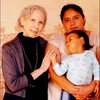Department of Psychology Associate Professor Joseph McFall and five co-authors had two papers published in the journal Emerging Adulthood and a dataset published in the Journal of Open Psychology Data.
Their project resulted from a national collaborative project to advance the understanding of the concept of “emerging adulthood.”
“Emerging adulthood is a tendency for young adults to delay traditional activities that serve as societal markers of adulthood (e.g., marriage, living independently from parents, raising children, starting a career) in pursuit of other goals or activities (e.g., education, career exploration, identity exploration),” Dr. McFall explained.
“Researchers suspect that increases in life expectancy and cultural changes, especially in developed nations, drive this lengthening of the time between adolescence and traditional adulthood,” McFall concluded.
Their research, based on information from 34 colleges and universities located primarily in the United States, tested the psychometrics (reliability and validity) of some of the scales that are used to assess emerging adulthood, as shown online. The measures were used to perform a replication study to test whether previous research about individual differences in young adults’ personality and values vary across regions, as shown online.
Data from the group’s dataset for other researchers to use can be found online.



